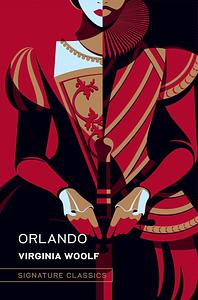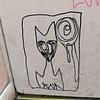Take a photo of a barcode or cover
adventurous
challenging
reflective
slow-paced
Plot or Character Driven:
Character
Strong character development:
Yes
Loveable characters:
No
Diverse cast of characters:
No
Flaws of characters a main focus:
Yes
This was such a great, quirky concept, and the writing started off really beautiful with some captivating events, before quickly descending into an incredibly boring, pretentious and long-winded essay that felt like Woolf showing off how many big words she knows.
The dramatic and romantic writing style worked at the beginning, especially with the feverish and fantastical sequence on the frozen Thames, and even in Turkey right up until Orlando transformed into a woman. But once she was back in England, it just got incredibly dull and repetitive. A big chunk of this is just landscape descriptions and long lists of items, people and things Orlando can see through a window. I don't mind a plotless book but by the end I was kind of confused, and with barely any supporting cast the whole book rested on the shoulders of Orlando, who I unfortunately found spoiled, pretentious and irritating.
I don't know maybe I missed the point but I thought this would be a book on queerness and gender, and as Woolf is a famous feminist writers I thought she'd have something poignant and interesting to say about the constraints of gender identity, but instead we just got long ramblings about literature, poetry and general melancholy from a spoiled brat waiting for the meaning of life to fall into their lap. Like sure, Orlando is bisexual and it's mentioned he has lovers of either gender but only heteronormative relationships are actually explored in any meaningful detail (Sasha when he's a man, and Shel when he's a woman). Also Orlando got offensively dull and dramatic when he became a woman, and finding her finding completion in being "a real woman at last" after getting married was so disappointing.
This was written in the 20s, I was expecting MORE of breaking gender stereotypes and LESS overt racism, but unfortunately I got the opposite. It gets two stars because the river sequence was genuinely enchanting, there were some interesting themes briefly touched on, and the writing was captivating at times, but mostly I just found this an absolute chore to finish.
The dramatic and romantic writing style worked at the beginning, especially with the feverish and fantastical sequence on the frozen Thames, and even in Turkey right up until Orlando transformed into a woman. But once she was back in England, it just got incredibly dull and repetitive. A big chunk of this is just landscape descriptions and long lists of items, people and things Orlando can see through a window. I don't mind a plotless book but by the end I was kind of confused, and with barely any supporting cast the whole book rested on the shoulders of Orlando, who I unfortunately found spoiled, pretentious and irritating.
I don't know maybe I missed the point but I thought this would be a book on queerness and gender, and as Woolf is a famous feminist writers I thought she'd have something poignant and interesting to say about the constraints of gender identity, but instead we just got long ramblings about literature, poetry and general melancholy from a spoiled brat waiting for the meaning of life to fall into their lap. Like sure, Orlando is bisexual and it's mentioned he has lovers of either gender but only heteronormative relationships are actually explored in any meaningful detail (Sasha when he's a man, and Shel when he's a woman). Also Orlando got offensively dull and dramatic when he became a woman, and finding her finding completion in being "a real woman at last" after getting married was so disappointing.
This was written in the 20s, I was expecting MORE of breaking gender stereotypes and LESS overt racism, but unfortunately I got the opposite. It gets two stars because the river sequence was genuinely enchanting, there were some interesting themes briefly touched on, and the writing was captivating at times, but mostly I just found this an absolute chore to finish.
I personally couldn’t appreciate Woolf’s vernacular and found her style of writing unappealing.
challenging
funny
lighthearted
mysterious
relaxing
slow-paced
Plot or Character Driven:
Character
Strong character development:
Yes
Loveable characters:
Yes
Diverse cast of characters:
No
Flaws of characters a main focus:
Yes
The first time I read this, hard on the heels of /To the Lighthouse/ and /Mrs. Dalloway/, I didn't much care for it. I can't account for that--it could have been overwork, could have been indigestion--but I suspect it had something to do with an underdeveloped sense of humor. This time around, what riches! I particularly loved the 3-page weather event that is the 19th century. DAMP!
adventurous
funny
reflective
medium-paced
Plot or Character Driven:
Character
challenging
funny
mysterious
reflective
slow-paced
adventurous
challenging
emotional
funny
mysterious
reflective
medium-paced
Plot or Character Driven:
Character
Strong character development:
Yes
Loveable characters:
Yes
Diverse cast of characters:
No
Flaws of characters a main focus:
No
Graphic: Racial slurs
adventurous
funny
reflective
medium-paced
Plot or Character Driven:
Character
Strong character development:
Yes
Loveable characters:
Yes
Diverse cast of characters:
No
Flaws of characters a main focus:
Complicated
This is by far one of my favorite Woolf novels that I've read thus far. She brilliantly plays with the novel's conventions to tell Orlando's unbelievable story. I agree with the critics when they say that this is Woolf's most approachable novel, and I think that it would be a great text to dive into through the lens of gender and feminist theory. Moreover, I think that it's absolutely adorable that this text might have been intended as a love letter. Throughout the book, Woolf pampers readers with eloquent lyricism on reading and the creative craft of writing. These moments and just the overall composure of the novel as a whole will leave you stunned. Its style situates perfectly in the middle of the Modern era, and I find it hard to believe you wouldn't be a fan if you enjoy Modern literature.






